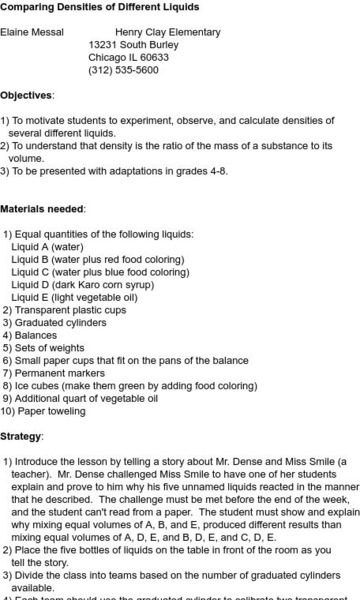Hi, what do you want to do?
Curated OER
How Hot Is It?
Fourth graders practice estimating temperatures. They practice in Celsius and Fahrenheit.
Curated OER
A Real Difference
Fifth graders use the Celsius and Fahrenheit thermometers to compare temperature readings. They use the Internet to find the temperatures of selected cities. After data is collected for five days, 5th graders graph the temperatures.
Curated OER
Using Multiplication to Solve Word Problems
Students explore math functions by solving word problems in class. In this multiplication lesson, students utilize colored cubes and base blocks to visualize multiplication problems. Students identify the multiplication values within...
Curated OER
Discovering Pi
Fourth graders are introduced and experiment with the concept of pi. Using this information, they discover the relationship between the circumference and diameter of circles. In groups, they practice measuring the circumference of...
Curated OER
The Same But Different
Fourth graders identify the characteristics of a simple physical change. They describe objects by the properties of the materials from which they are made. Students discuss the different states of matter and their distinct physical...
Curated OER
Avogadro's Law
Students study Avogadro's law and what it means in science. In this gaseous instructional activity students complete an Avogadro's law experiment.
Curated OER
Science Word Search
In this science worksheet, students locate and identify various vocabulary terms related to earth science. There are 44 words/phrases located in the puzzle.
Curated OER
Paper Packaging Design
Students discuss the relationship between technology and manufacturing. They then use their ideas to construct a model of a paper board carton package. Next they view a PowerPoint presentation to learn about the history of packaging...
Curated OER
Matter, Matter, Everywhere!
Eighth graders make inquiry about the existence of matter. A definition of the word is needed before students can engage in various activities. The application of knowing about matter is done in the working of experiments.
LABScI
Freezing Point Depression: Why Don’t Oceans Freeze?
Can you go ice fishing in the ocean? Learners examine the freezing point of different saltwater solutions. Each solution has a different concentration of salt. By comparing the freezing points graphically, they make conclusions...
Curated OER
Figuring Elapsed Time
Students discover the concept of elapsed time. In this calculating time lesson plan, students utilize the Internet to complete record sheets based on the concept of elapsed time. Finally, the students answer questions on their own.
Curated OER
Water Monitoring Vocabulary
As the title implies, this is a list of vocabulary terms relating to water monitoring. If your ecology class is learning about how to test water quality, this will be an appropriate reference sheet for them. As a bonus, if you live in...
Curated OER
Density Columns
Eighth graders create solutions with 5 different densities. In this chemistry instructional activity, 8th graders analyze the density of solutions stacked on top of each other. They document their data through graphing. This assignment...
Curated OER
Air: It's a Gas!
Young scholars investigate the properties of air through hands-on activities in conjunction with the demonstrations in a 3-2-1 Contact Video.
Curated OER
Science Quiz-Grade 6
In this grade 6 science quiz worksheet, 6th graders complete a 15 question multiple choice quiz covering a variety of grade 6 concepts.
Curated OER
Science Word Search
In this science learning exercise, students look for the words that are related to the theme of the sheet in the word search. They also work on spelling skills.
Curated OER
The Pressure's Off
Students investigate air pressure with four hands-on activities. They observe experiments by viewing Take a Look 2 #21.
Khan Academy
Khan Academy: Estimating Mass
In this exercise, students practice estimating mass. Students receive immediate feedback and have the opportunity to get step-by-step hints and try questions repeatedly. CCSS.Math.Content.3.MD.A.2 Measure and estimate liquid volumes and...
Khan Academy
Khan Academy: Word Problems With Mass
In this exercise, students practice arithmetic word problems with mass. Students receive immediate feedback and have the opportunity to get hints, watch a tutorial video, and try questions repeatedly. CCSS.Math.Content.3.MD.A.2 Measure...
ibiblio
Ibiblio: How Many? A Dictionary of Units of Measurement
The Center for Mathematics and Science Education at the University of North Carolina at Chapel Hill provides an interesting and easy-to-use dictionary of the history and meaning of many measurement terms. Metric, International, and...
PBS
Nova Online: How Many Pearls? A Weight & Volume Game
This interactive game has students apply skills in estimation, measurement, and basic addition using pearls. Students are asked to estimate the number of pearls in a treasure chest by making predictions and using number sense. The skills...
Other
Conversions for Weight Measurements
This site allows you to convert weight/mass measurements. For example converting tons to grams. CCSS.Math.Content.3.MD.A.2 Measure and estimate liquid volumes and masses of objects using standard units
PBS
Pbs Learning Media: Fitness Dice: Lesson Plan
Read the die to find out what exercise to do and how many repetitions are needed, keep a running tally of rolls to see who gets the highest score.
Science and Mathematics Initiative for Learning Enhancement (SMILE)
Smile: Comparing Densities of Different Liquids
This lab experiment has students observe and compare the density of five different liquids while measuring mass and volume.




























